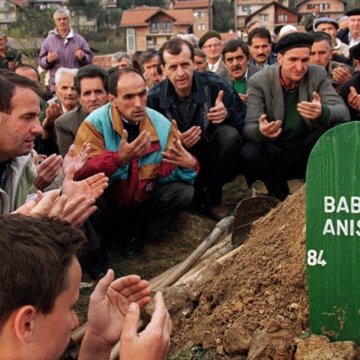- About
- Topics
- Story
- In-Depth
- Picks
- Opinion
- News
- Donate
- Signup for our newsletterOur Editors' Best Picks.Send
Read, Debate: Engage.
According to official estimate 8,372 Bosnian Muslim people, mostly men and boys, including 421 child victims, were killed after the Bosnian Serb army attacked Srebrenica on 10-11 July 1995 - a designated UN "safe area".
20 years after still about 1,000 people are missing, and full transparency on how the genocide despite the presence of UN peacekeepers could have happened isn't provided. New research reveals that Britain and the US knew weeks before the massacre that enclave would fall – but they decided to sacrifice it in their efforts for peace reports the Guardian.
In the meantime still thousands of families of the victims of the Srebrenica genocide continue to be denied justice, truth and reparation, said Amnesty International.
John Dalhuisen, Amnesty International’s Director for Europe and Central Asia criticises that “two decades after the world averted its gaze from the worst crime to be committed on European soil since 1945, the families of the victims of the Srebrenica genocide are still awaiting justice.”
A European Parliament resolution officially made the 11th of July a Day of Commemoration of the genocide throughout the European Union. However, on 8 July, Russia vetoed a UN Security Council resolution on the Srebrenica genocide. The resolution would have recognised Srebrenica as a genocide and acknowledged the urgent need to provide justice to the victims and long-term support to survivors, including survivors of sexual violence, and clarifying the fate and whereabouts of the more than 8,000 still missing from the war.
Despite the high-level prosecutions of the principal architects of the Srebrenica genocide – Radovan Karadžiæ, Ratko Mladiæ and Slobodan Miloševiæ – at the International Criminal Tribunal for the former Yugoslavia and the convictions of 74 others by the Tribunal, there is still a huge backlog of unresolved cases. Prosecution of crimes under international law in domestic courts is very slow. The vast majority of those suspected of war crimes and crimes against humanity enjoy impunity, safe in the knowledge that, without political will, they will never be held to account.
Against this backdrop John Dalhuisen said that “Srebrenica not only stands as stark reminder of humanity’s capacity for depravity but also of the failure of the international community to prevent genocide from happening in plain view.”
Image: Screenshot Amnesty.org/Getty
